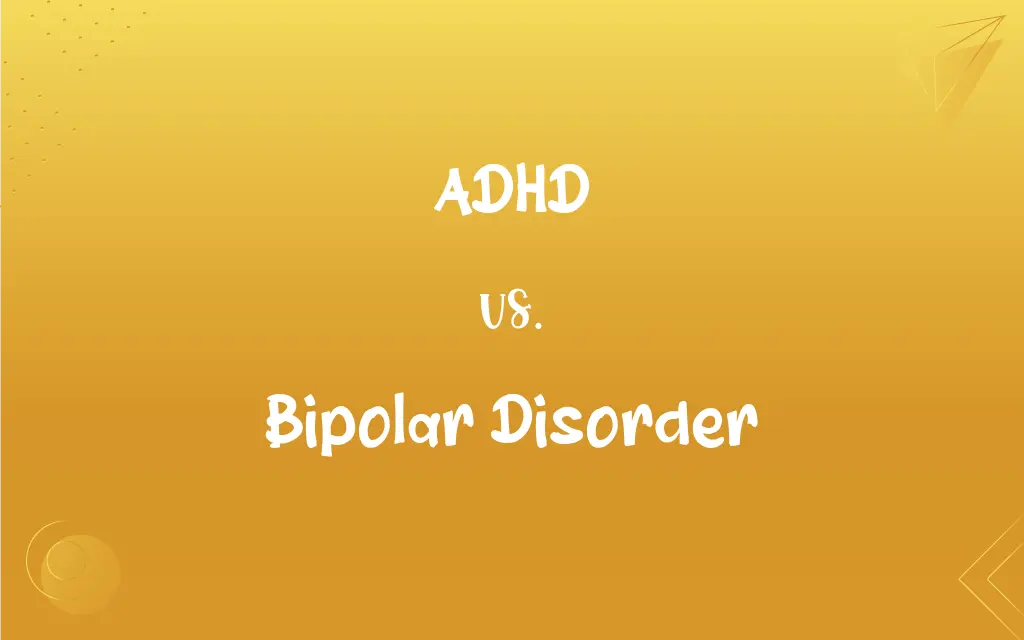ADHD vs. Bipolar Disorder: What's the Difference?
Edited by Aimie Carlson || By Janet White || Published on March 30, 2024
ADHD is a neurodevelopmental disorder characterized by inattention, hyperactivity, and impulsivity. Bipolar disorder is a mood disorder with episodes of mood swings ranging from depressive lows to manic highs.

Key Differences
ADHD, or Attention Deficit Hyperactivity Disorder, and bipolar disorder are distinct conditions, though they can share some overlapping symptoms such as impulsivity and mood instability. ADHD is primarily a neurodevelopmental disorder that affects concentration, the ability to stay organized, and impulse control. Bipolar disorder, on the other hand, is characterized by extreme mood swings that include emotional highs (mania or hypomania) and lows (depression). These mood swings are more severe than the normal ups and downs most people experience and can affect sleep, energy levels, behavior, judgment, and the ability to think clearly.
ADHD symptoms are generally consistent and continue over time, bipolar disorder symptoms are episodic, with periods of normal mood in between. ADHD is often identified in childhood and continues into adulthood. Bipolar disorder may also start during childhood or adolescence, but it is more commonly diagnosed in late adolescence or adult years.
Treatment approaches for ADHD typically include medication, education, training, and psychological counseling. These treatments aim to reduce symptoms and improve functioning. Bipolar disorder treatments may include mood stabilizers, antipsychotic medications, and psychotherapy to manage and minimize mood swings and related symptoms.
Misdiagnosis can occur between ADHD and bipolar disorder due to symptom overlap, particularly in the realms of impulsivity and difficulty focusing. However, the underlying causes, treatment strategies, and long-term management differ significantly between the two conditions, emphasizing the importance of accurate diagnosis.
Comparison Chart
Primary Symptoms
Inattention, hyperactivity, impulsivity
Mood swings (depressive and manic episodes)
ADVERTISEMENT
Age of Onset
Early childhood
Late adolescence or early adulthood
Symptom Consistency
Symptoms are consistent and persistent
Symptoms occur in episodic swings
Treatment
Stimulants, behavior therapy
Mood stabilizers, psychotherapy
Nature of Disorder
Neurodevelopmental
Mood disorder
ADHD and Bipolar Disorder Definitions
ADHD
ADHD affects focus, self-control, and activity levels.
The student with ADHD found it hard to stay seated during class.
ADVERTISEMENT
Bipolar Disorder
Decision-making can be impaired during episodes.
In a manic episode of bipolar disorder, she made risky investments.
ADHD
Individuals may seem to move about constantly.
Her ADHD led to fidgeting and difficulty relaxing.
Bipolar Disorder
Bipolar disorder involves extreme emotional states.
During a manic episode of bipolar disorder, he felt on top of the world.
ADHD
Those with ADHD may struggle to complete tasks.
Despite trying hard, his ADHD made it difficult to finish his homework.
Bipolar Disorder
Periods of very low mood and energy.
Her bipolar disorder led to days where she couldn't get out of bed.
ADHD
Making hasty actions without thought.
His ADHD contributed to impulsive decisions that he later regretted.
Bipolar Disorder
High energy, euphoria, or irritability.
His bipolar disorder caused him to start numerous projects simultaneously during a manic phase.
ADHD
ADHD can impact social and academic performance.
She used strategies to manage her ADHD and improve her study habits.
Bipolar Disorder
Treatment often involves medication and therapy.
He manages his bipolar disorder with medication and regular therapy sessions.
ADHD
A condition (mostly in boys) characterized by behavioral and learning disorders
FAQs
How is ADHD diagnosed?
Diagnosis is based on clinical assessments, including symptom checklists, and often information from family and teachers about behavior over time.
What triggers bipolar disorder episodes?
Episodes can be triggered by stress, drug or alcohol abuse, and changes in sleep patterns, though sometimes they occur without a clear trigger.
How is bipolar disorder diagnosed?
Diagnosis involves careful observation of symptoms, including the duration of mood episodes, and may include a psychiatric evaluation.
What causes ADHD?
ADHD is thought to be caused by genetic factors, brain structure and function, and environmental influences.
Can ADHD and bipolar disorder coexist?
Yes, it's possible for an individual to be diagnosed with both conditions, though careful diagnosis is needed due to overlapping symptoms.
Are there different types of ADHD?
Yes, ADHD can be predominantly inattentive, predominantly hyperactive-impulsive, or a combination of both.
Is medication always necessary for ADHD?
Not always, but it's often an effective part of treatment, especially in combination with behavioral therapies.
Can ADHD affect relationships?
Yes, difficulties with attention, impulsivity, and hyperactivity can challenge personal and professional relationships.
Can lifestyle changes help manage ADHD?
Yes, regular exercise, a healthy diet, and structured routines can help manage symptoms.
Do bipolar disorder symptoms change over time?
The pattern of mood swings can vary, and with treatment, many find their symptoms become less severe or less frequent.
What are the types of bipolar disorder?
There are several types, including Bipolar I, Bipolar II, and Cyclothymic Disorder, each with distinct patterns of mood swings.
How common is bipolar disorder?
Bipolar disorder affects about 2.8% of the U.S. population each year.
Can lifestyle changes help with bipolar disorder?
Yes, maintaining a regular sleep schedule, avoiding alcohol and drugs, and stress management can help stabilize mood swings.
Is medication always required for bipolar disorder?
Medication is a key part of managing bipolar disorder, often necessary for stabilizing mood swings.
How do ADHD symptoms change with age?
Hyperactivity often decreases with age, but inattention and impulsivity may persist into adulthood.
What support is available for ADHD?
Support can include educational assistance, psychotherapy, support groups, and medication.
What support is available for bipolar disorder?
Treatment may involve psychiatric care, medication management, psychotherapy, and support groups.
How common is ADHD?
ADHD is one of the most common neurodevelopmental disorders of childhood.
Can bipolar disorder affect relationships?
Yes, the emotional highs and lows can strain relationships, making communication and mutual understanding crucial.
Can ADHD and bipolar disorder be cured?
There is no cure for either condition, but both can be effectively managed with the right treatment plan.
About Author
Written by
Janet WhiteJanet White has been an esteemed writer and blogger for Difference Wiki. Holding a Master's degree in Science and Medical Journalism from the prestigious Boston University, she has consistently demonstrated her expertise and passion for her field. When she's not immersed in her work, Janet relishes her time exercising, delving into a good book, and cherishing moments with friends and family.
Edited by
Aimie CarlsonAimie Carlson, holding a master's degree in English literature, is a fervent English language enthusiast. She lends her writing talents to Difference Wiki, a prominent website that specializes in comparisons, offering readers insightful analyses that both captivate and inform.
































































